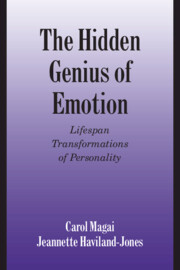Book contents
- Frontmatter
- Contents
- Preface
- Part I Introduction
- Part II Emotion as the Integrative Link in Social and Personality Development
- Part III Emotion as the Link in Intellectual Work
- Part IV Emotion as the Link in Therapeutic Behavior
- Part V Presenting a New View
- 11 Summarizing the Emotional Links
- 12 Lives and Change
- Appendix
- References
- Subject Index
- Author Index
- Cambridge Cultural Social Studies
11 - Summarizing the Emotional Links
Published online by Cambridge University Press: 25 June 2009
- Frontmatter
- Contents
- Preface
- Part I Introduction
- Part II Emotion as the Integrative Link in Social and Personality Development
- Part III Emotion as the Link in Intellectual Work
- Part IV Emotion as the Link in Therapeutic Behavior
- Part V Presenting a New View
- 11 Summarizing the Emotional Links
- 12 Lives and Change
- Appendix
- References
- Subject Index
- Author Index
- Cambridge Cultural Social Studies
Summary
The wealth of material available to us from the three cases of practicing clinicians – through the various ideographic venues – afforded an excavation of a depth seldom available to the developmental researcher, although it is more common in clinical practice. To the clinician's rich access, we add insights from affect theory and attachment theory, quantitative and qualitative analysis of emotional and intellectual process over time, and contextualization within a dynamic systems framework. In so doing, we have arrived at deeper understandings about developmental process and several interesting discoveries involving attachment relationships, affects as dynamic systems, the transformation of affects into values, and continuity and change. Those new understandings are summarized and elaborated upon in this chapter as we bring the observations of the three lives together and consider what we have learned about different spheres of development.
In Chapter 2, we introduced several concepts from dynamic systems. One concept was that personality works as a system that originally arises from chaos and becomes self-organizing. Such dynamic systems are thought to be characteristic both of nonliving systems such as tornadoes and of living systems with concepts of “self” and identity. In human life, we have proposed, emotions are the energy forces and the primary organizers of experience. Emotion saturates experience with vitality or dread, hope or despair, feelings of omnipotence or weakness – which are powerful motivational forces. Emotion provides direction and force.
- Type
- Chapter
- Information
- The Hidden Genius of EmotionLifespan Transformations of Personality, pp. 447 - 472Publisher: Cambridge University PressPrint publication year: 2002



